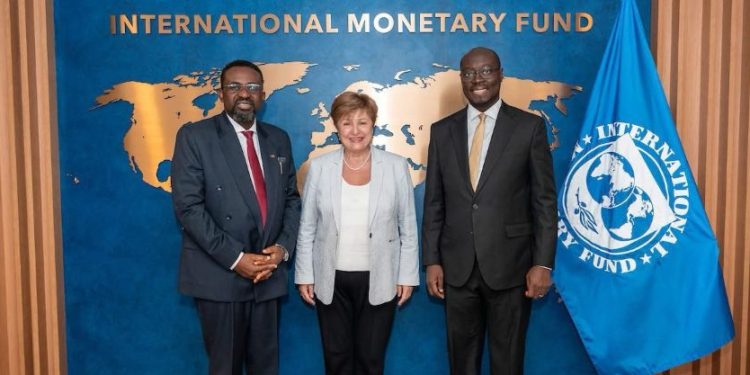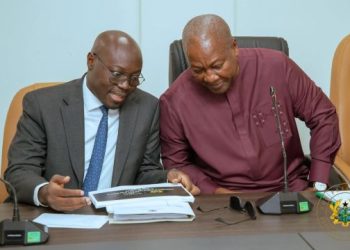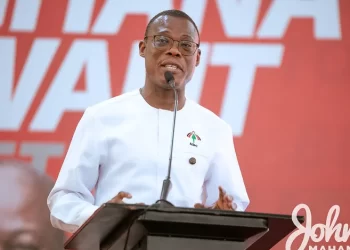The International Monetary Fund (IMF) has issued a strong advisory to the Bank of Ghana (BoG), urging the central bank to scale back its foreign exchange interventions and adopt a more transparent, rules-based approach to currency management.
This call comes at a time when the Ghanaian cedi is recording remarkable appreciation, sparking concerns that the gains may be artificially propped up by central bank action.
In a post-review statement following the completion of Ghana’s fourth programme assessment under the $3 billion Extended Credit Facility (ECF), IMF Deputy Managing Director Bo Li called on the BoG to “reduce its footprint in the foreign exchange market” and “allow for greater exchange rate flexibility.”
He further urged the central bank to adopt a formal foreign exchange (FX) intervention policy framework to guide its operations and enhance market transparency.
The IMF’s caution signals a need for greater clarity in the BoG’s management of the currency market.
The cedi, which opened 2025 trading at GH₵14.7 to the dollar, has since appreciated to GH₵10.39.
Last week, the Cedi depreciated against the US Dollar by 0.10%, ending the week at GH₵10.3200 per Dollar, with a year-to-date appreciation of 42.44%.
The Cedi appreciated by 0.43% against the British pound, closing the week at GH₵14.0879, with a year-to-date appreciation of 30.61%.
The Cedi also depreciated against the Euro by 0.48% to settle at GH₵12.1259, with a year-to-date appreciation of 25.47%, based on Bank of Ghana’s interbank midrates.
Indicative rates from the open market showed the Cedi closing at midrate GH₵10.48 to the Dollar, GH₵14.38 against the British Pound and GH₵12.36 to the Euro.
While this trend has eased inflationary pressures and bolstered import affordability, the Fund’s recommendation suggests the appreciation may be unsustainable without a clearly defined FX policy to anchor market expectations.
$367m disbursed under IMF Programme
As part of its ongoing engagement with Ghana, the IMF Executive Board has approved the disbursement of $367 million under the ECF programme, bringing total disbursements to date to over $1.4 billion.
The disbursement follows a successful review of Ghana’s economic reform progress and macroeconomic performance.
Ghana’s ECF arrangement, which began in 2023 and runs through 2026, is aimed at restoring macroeconomic stability, achieving debt sustainability, and laying the foundation for inclusive economic growth.
According to the IMF, the new funds will help Ghana continue stabilising its economy while pursuing structural reforms that promote long-term fiscal health and resilience.
Bo Li, commenting on the latest release, praised the government’s recent policy decisions and noted the Fund’s confidence in Ghana’s ability to stay on course.
“Combined with ongoing reform efforts and an improved external position, the corrective measures are set to support Ghana in reaching the goals of economic stabilisation, rebuilding resilience, and fostering higher and more inclusive growth,” he stated.
Ghana’s economy outperforming expectations
According to the IMF’s review, Ghana’s economic performance has exceeded expectations in 2024 and 2025, with strong output recorded in sectors such as mining, agriculture, manufacturing, ICT, and construction.
The external sector has also improved significantly, thanks to rising export earnings—particularly from gold—and increased remittances.
“The external sector has seen considerable improvement, driven by solid exports—particularly gold and to a lesser extent oil—and higher remittances,” the IMF noted in its assessment.
These positive trends have contributed to the country’s improving current account balance and rising gross international reserves, reinforcing market confidence and helping to stabilise the cedi. However, the IMF warned that continued success will depend on deepening reforms and avoiding complacency.
Debt restructuring and fiscal discipline still critical
Despite the improving outlook, the IMF reiterated the importance of completing Ghana’s ongoing debt restructuring efforts and maintaining a tight grip on public finances.
It noted that while the 2025 budget aligns well with the programme’s objectives, more work is needed to strengthen domestic revenue mobilisation, control public spending, and boost financial sector governance.
“Looking ahead, staying the course of fiscal adjustment and completing the debt restructuring are key to ensure fiscal sustainability,” Bo Li stated.
He commended the passage of a new fiscal responsibility framework, as well as progress made in rebuilding reserves and curbing inflation.
The Fund emphasized that full implementation of these measures is necessary to anchor investor confidence and ensure that Ghana’s recovery remains on track. Ghana’s fiscal authorities were urged to stay committed to the agreed budget path and avoid unplanned expenditures that could derail progress.
Energy sector and SOE reforms remain a priority
In addition to monetary and fiscal policies, the IMF highlighted the urgent need for reforms in the energy sector and among state-owned enterprises (SOEs).
Long-standing inefficiencies and financial losses continue to impose a heavy burden on public finances, according to the Fund.
Bo Li called for the resolution of arrears, improved operational efficiency, and structural changes in the management of SOEs, particularly in the power and utilities sectors.
He also stressed the importance of safeguarding social protection programmes and prioritising investments in health, education, and infrastructure.
“This should be supported by continued efforts to enhance domestic revenue mobilisation and streamline non-priority expenditure, while creating space for development priorities and enhanced social safety nets,” he said.
Govt welcomes IMF endorsement
In response to the Fund’s decision, Ghana’s Ministry of Finance issued a statement welcoming the disbursement and reaffirming its commitment to the reform agenda.
The Ministry described the IMF’s approval as a strong endorsement of Ghana’s economic strategy.
“Our comprehensive macroeconomic policies and carefully crafted structural reforms are delivering real results that the international community recognizes and supports,” the Ministry said.
With the fifth review of the ECF programme expected in early 2026, the government is expected to continue implementing reforms, focusing particularly on strengthening the financial sector, finalising debt negotiations, and ensuring that growth remains both sustainable and inclusive.











